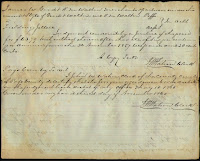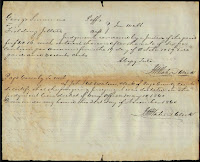The world is too much with us; late and soon,
Getting and spending, we lay waste our powers:
(from William
Wordsworth “The World Is Too Much With Us”)
“Getting and spending” – that sums up about 25 years worth
of Fielding Jollett’s activities as a farmer and citizen of Page County,
Virginia. He didn’t grow from a 2-acre
farmette to a 300-acre farm overnight, but evidently he was living beyond his
means.
Fielding borrowed money from lots of people, and maybe he
was buying on credit. In the Chancery
complaint against him filed by merchants James W. Good and Reuben M. Walton, exhibit after exhibit of judgments proves he owed quite a bit to quite a few.
$43.79
plus interest from November 1857 plus 30 cents costs due to Good and Walton
$30.77
plus interest from November 1857 plus 30 cents costs due to Good and Walton
$40.16
plus interest from October 1859 plus 30 cents costs due to George Summers
$50
plus interest from January 1859 plus 60 cents costs due to George W. Shuler
These debts don’t look like much, but if online inflation calculators can be trusted, Fielding’s debts totaled roughly $7,000.
To get an idea of who these men were and how they were
able to come to Fielding’s aid, I located them in the 1850 Federal Census for
Page County, Virginia, and in the agricultural (non-population) census for the
same year. It was immediately obvious
that Fielding was just a small-time farmer.
Good and Walton are not included in the chart since they
were not listed as farmers in 1850. Good
was a cabinet maker and Walton was a tanner.
But by 1860, both had accumulated some measure of wealth. Good, a miller and farmer, valued his real
estate at $4500 and personal property at $950.
Walton was a merchant with real estate worth $5000 and personal property
valued at $6700.
Of course, anyone looking to borrow money would go to
someone who had the money to lend, so it only makes sense that these men should
be financially better off than Fielding.
But he was a small-time farmer struggling to keep up even by comparison
to his nearest neighbors.
Next time: the
outcome






As you laid things out, it looks as if Fielding was an inefficient Farmer. He has a larger total acreage than Summers and a smaller acreage than Shuler, but in both instances the proportion of improved land is a lot lower. Maybe he was working alone and the others were able to employ labourers to work their land, but given his low improved acreage he would only just able to keep the wolf from the door most of the time. Any bad harvest, he would need to borrow. Was 1857 and 1859 good or bad years for farmers?
ReplyDeleteI've enjoyed Fieldings story and look forward to its conclusion. Do you have a photograph of him?
I wish I were smart enough to find information on the weather and farm conditions in the 1850s because that might provide some insight. But I do agree he was probably working alone after his sons married.
DeleteAs for pictures, I have none of Fielding although I have pictures of his sons John Wesley and James Franklin (my 2G grandfather). They give me a glimmer of what he must have looked like.
Hi Wendy, farming is hard work and so much can go wrong. I enjoyed this post, it reminded me of my Uncle Kit, and how I found many past-due notices among his papers.
ReplyDeleteKathy M.
Thank you for posting this blog. Fielding is my 4th GGFATHER.
ReplyDeleteIt appear very challenging to find weather records in the US during this time. Based on many generalizations and weather in Europe, it appears that 1850 was rather cold. Farmers in Ireland had many issues.
Really!? Please email me if you're interested in sharing information.
Delete